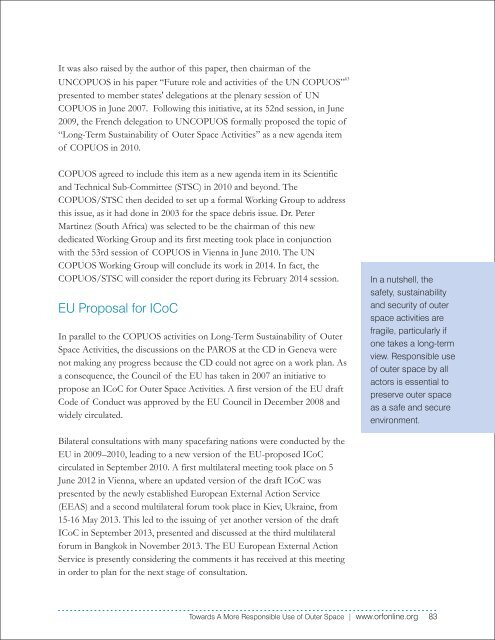AwaitingLaunch_1397728623369
AwaitingLaunch_1397728623369
AwaitingLaunch_1397728623369
You also want an ePaper? Increase the reach of your titles
YUMPU automatically turns print PDFs into web optimized ePapers that Google loves.
It was also raised by the author of this paper, then chairman of the<br />
63<br />
UNCOPUOS in his paper “Future role and activities of the UN COPUOS”<br />
presented to member states' delegations at the plenary session of UN<br />
COPUOS in June 2007. Following this initiative, at its 52nd session, in June<br />
2009, the French delegation to UNCOPUOS formally proposed the topic of<br />
“Long-Term Sustainability of Outer Space Activities” as a new agenda item<br />
of COPUOS in 2010.<br />
COPUOS agreed to include this item as a new agenda item in its Scientific<br />
and Technical Sub-Committee (STSC) in 2010 and beyond. The<br />
COPUOS/STSC then decided to set up a formal Working Group to address<br />
this issue, as it had done in 2003 for the space debris issue. Dr. Peter<br />
Martinez (South Africa) was selected to be the chairman of this new<br />
dedicated Working Group and its first meeting took place in conjunction<br />
with the 53rd session of COPUOS in Vienna in June 2010. The UN<br />
COPUOS Working Group will conclude its work in 2014. In fact, the<br />
COPUOS/STSC will consider the report during its February 2014 session.<br />
EU Proposal for ICoC<br />
In parallel to the COPUOS activities on Long-Term Sustainability of Outer<br />
Space Activities, the discussions on the PAROS at the CD in Geneva were<br />
not making any progress because the CD could not agree on a work plan. As<br />
a consequence, the Council of the EU has taken in 2007 an initiative to<br />
propose an ICoC for Outer Space Activities. A first version of the EU draft<br />
Code of Conduct was approved by the EU Council in December 2008 and<br />
widely circulated.<br />
In a nutshell, the<br />
safety, sustainability<br />
and security of outer<br />
space activities are<br />
fragile, particularly if<br />
one takes a long-term<br />
view. Responsible use<br />
of outer space by all<br />
actors is essential to<br />
preserve outer space<br />
as a safe and secure<br />
environment.<br />
Bilateral consultations with many spacefaring nations were conducted by the<br />
EU in 2009–2010, leading to a new version of the EU-proposed ICoC<br />
circulated in September 2010. A first multilateral meeting took place on 5<br />
June 2012 in Vienna, where an updated version of the draft ICoC was<br />
presented by the newly established European External Action Service<br />
(EEAS) and a second multilateral forum took place in Kiev, Ukraine, from<br />
15-16 May 2013. This led to the issuing of yet another version of the draft<br />
ICoC in September 2013, presented and discussed at the third multilateral<br />
forum in Bangkok in November 2013. The EU European External Action<br />
Service is presently considering the comments it has received at this meeting<br />
in order to plan for the next stage of consultation.<br />
Towards A More Responsible Use of Outer Space | www.orfonline.org 83








